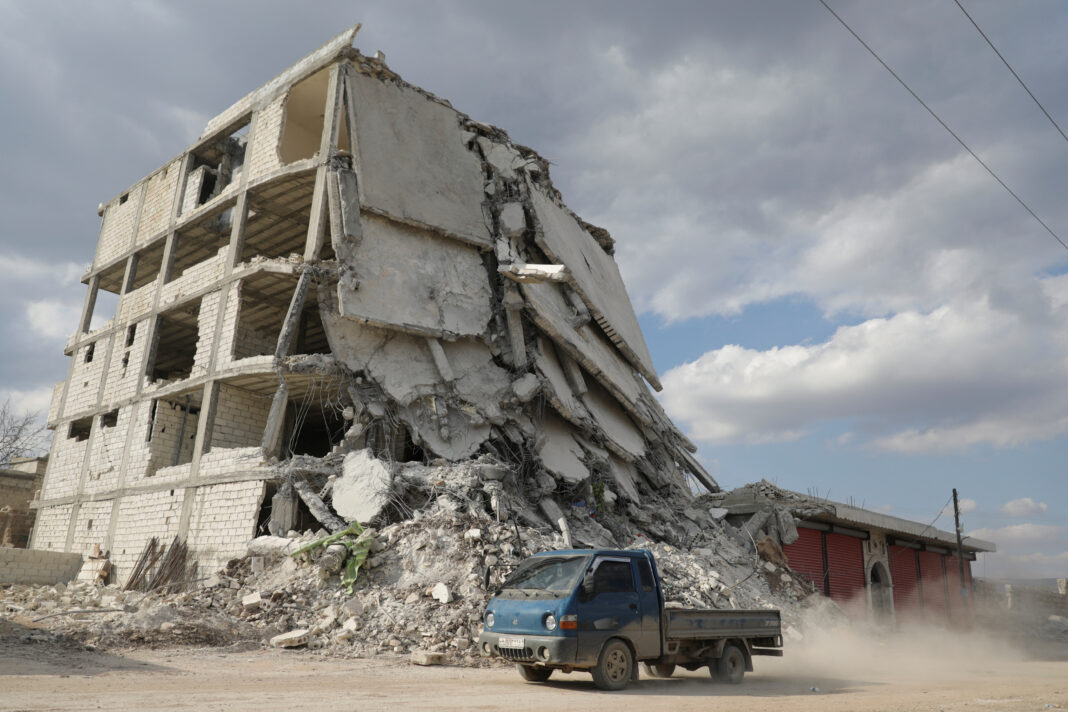“Aid diplomacy”: the geopolitics underlying the Syrian and Turkish earthquakes
In contrast with the rapid and diligent collective response, the UN Security Council appears stuck in passing a resolution for the provision of aid, proving that, even in the face of the disaster, geopolitics still pull the reins of every great international decision.

As the death toll keeps increasing and hopes only get dimmer, the devastating consequences of the earthquakes that have plagued Turkey and Syria this last week parade under the eyes of the world. International organizations, NGOs and volunteers have desperately been trying to ease the conditions of the survivors and rescue those that have been trapped under the debris, but despite the collective efforts, the humanitarian crisis is clear and perhaps bound to get worse.
According to the estimates, around 22.000 lives have been claimed by the earthquake, which started on February 6th in southeastern Turkey and Syria, with a reported magnitude of 7.8. A few hours later, another shock of magnitude 7.5 occurred, with aftershocks perceived in all surrounding areas. The involved area is in fact a well-known seismic zone, as Turkey lies on two major faults: the North Anatolian Fault and the East Anatolian Fault. Moreover, the tectonic plate carrying both Turkey and Syria has recently been moving northwards, therefore colliding with the bordering plate, causing the seismic shifts whose consequences we are now witnessing.
Nevertheless, in spite of the infamous dangers of the area, the buildings did not prove resistant enough to face the calamity, and many people have died or gone missing under the ruins of their own homes. This can be attributed first of all to the difficulties of constructing structures equipped with isolation systems, whose foundation would be able to shift during the shocks while still being able to support the rest of the edifice. Structural limits are pressing in Turkey but even more urgent in Syria, where eleven years of conflict have made it impossible to enforce construction standards and have further damaged the buildings, especially since many war-damaged structures were rebuilt using any material available.
As if the damages caused by the disaster weren’t enough, the World Health Organization has warned that, unless aid is promptly distributed and ready projects of reconstruction are put into place, serious health hazards could occur, which would only serve to overplay the situation and exacerbate the problem. Once again, the matter is particularly critical for Syria, where a lot of communities depended on water reservoirs, which were the first to fall. If there were any shortcomings in the provision of water, the country could witness serious cholera outbreaks, especially since the illness was already an issue.
International relief has been active in gathering resources, for instance, the World Bank has pledged 1.78 billion dollars in aid to Turkey including immediate finance for rebuilding basic infrastructure and to support those affected by the earthquakes. Also, forty-five countries around the world have deployed rescue and humanitarian relief teams, but the challenges the rescuers will have to face are several and tough, because of the wintry weather with its bitter cold and heavy rain.
In contrast with the rapid and diligent collective response, the UN Security Council appears stuck in passing a resolution for the provision of aid, proving that, even in the face of the disaster, geopolitics still pull the reins of every great international decision. In fact, proposals of creating a corridor for food and aid through the northwestern Syria region, which is controlled by the rebels, has been blocked by Russia, that has been using its veto in favor of its ally Bashar-al-Assad. In fact, Bassam al-Sabbagh, Syria’s ambassador to the United Nations, has announced that the government will accept coordinated relief aid to all areas of its control, but will not tolerate passages in areas that are not controlled by its institutions.
Russia and Iran have mobilized a lot of forces to provide relief to the Turkish and Syrian population. Even Iraq has offered to provide assistance goods and basic necessities, but once again, political tensions could make it impossible to extend this offer also to the opposition-controlled parts of Syria. The prompt response of all these regional powers, supporters of the Syrian government, could stem from hidden agendas aimed at reinforcing the power of their ally under the pretense of helping the civilians.
Tightening the focus to the local politics, it is clear that the calamity will have an impact also on the turbulent bilateral relations between the two countries affected. Before the earthquake occurred, Erdogan had signaled interest in a rapprochement with the leader of the bordering country, Bashar-al-Assad, while remaining firm on his willingness to increase cross-border incursions in the Northern part of Syria to attack Kurdish groups. However, Turkish efforts of filling the void left by Western powers and adopting more offensive strategies have been perceived as threatening by Damascus’ regime and its allies. There is now a chance for Turkey and Syria to open a window for a sort of “aid diplomacy”, that could lead the two parties to a further convergence rooted in a common response to the disaster.
The destructive consequences of natural calamities are not under human control, yet, even in the face of a complex geopolitical situation, such as the one of Syria and Turkey, it is our responsibility to set aside collateral disputes that could slow down aid and keep the focus on helping the people and promptly committing to reconstruction.




